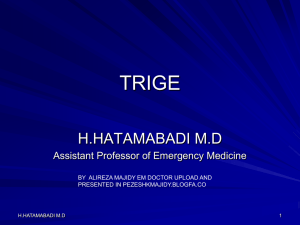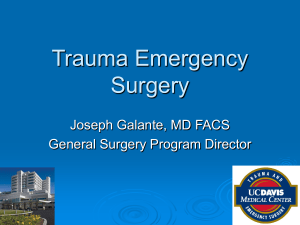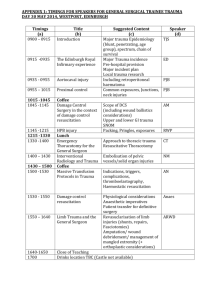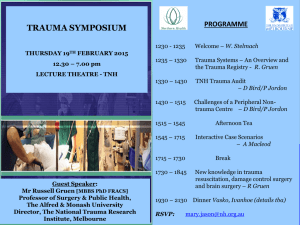EL 594 Syllabus
advertisement
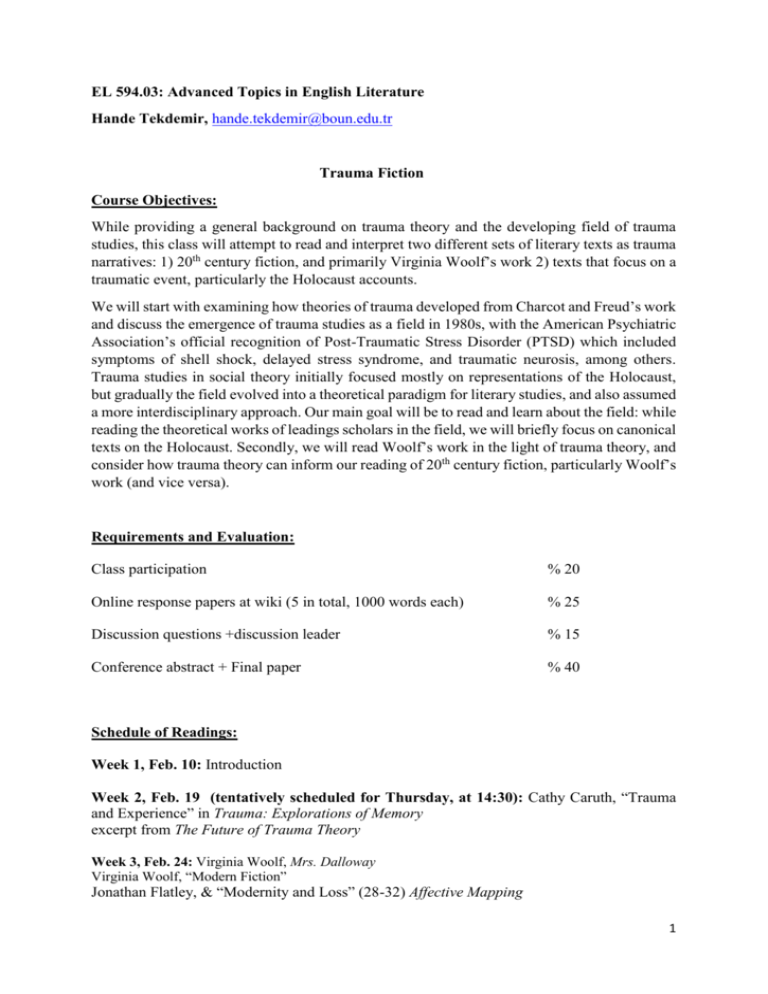
EL 594.03: Advanced Topics in English Literature Hande Tekdemir, hande.tekdemir@boun.edu.tr Trauma Fiction Course Objectives: While providing a general background on trauma theory and the developing field of trauma studies, this class will attempt to read and interpret two different sets of literary texts as trauma narratives: 1) 20th century fiction, and primarily Virginia Woolf’s work 2) texts that focus on a traumatic event, particularly the Holocaust accounts. We will start with examining how theories of trauma developed from Charcot and Freud’s work and discuss the emergence of trauma studies as a field in 1980s, with the American Psychiatric Association’s official recognition of Post-Traumatic Stress Disorder (PTSD) which included symptoms of shell shock, delayed stress syndrome, and traumatic neurosis, among others. Trauma studies in social theory initially focused mostly on representations of the Holocaust, but gradually the field evolved into a theoretical paradigm for literary studies, and also assumed a more interdisciplinary approach. Our main goal will be to read and learn about the field: while reading the theoretical works of leadings scholars in the field, we will briefly focus on canonical texts on the Holocaust. Secondly, we will read Woolf’s work in the light of trauma theory, and consider how trauma theory can inform our reading of 20th century fiction, particularly Woolf’s work (and vice versa). Requirements and Evaluation: Class participation % 20 Online response papers at wiki (5 in total, 1000 words each) % 25 Discussion questions +discussion leader % 15 Conference abstract + Final paper % 40 Schedule of Readings: Week 1, Feb. 10: Introduction Week 2, Feb. 19 (tentatively scheduled for Thursday, at 14:30): Cathy Caruth, “Trauma and Experience” in Trauma: Explorations of Memory excerpt from The Future of Trauma Theory Week 3, Feb. 24: Virginia Woolf, Mrs. Dalloway Virginia Woolf, “Modern Fiction” Jonathan Flatley, & “Modernity and Loss” (28-32) Affective Mapping 1 Week 4, March 3: continue Mrs. Dalloway Sigmund Freud, Beyond the Pleasure Principle Cathy Caruth, “Traumatic Departures: Survival and History in Freud” in Unclaimed Experience: Trauma, Narrative, and History Week 5, March 10: Virginia Woolf, To the Lighthouse Week 6, March 17: Theses on the Philosophy of History” by Walter Benjamin “Mourning and Melancholia” by Sigmund Freud Intro. in Loss: The Politics of Mourning (p. 1-7) by David L. Eng and David Kazanjian Week 7, March 24: excerpts from Primo Levi’s work Shoshana Felman, from Testimony: Crises of Witnessing in Literature, Psychoanalysis, and History Week 8, March 31: selected films and documentaries on the Holocaust Dominick La Capra, from Writing History, Writing Trauma Week 9, April 7: Marc Nichanian (TBA) Dori Laub, “Truth and Testimony: The Process and the Struggle” in Trauma: Explorations of Memory Week 10, April 14: guest lecturer, Lindsay Janssen, Radboud University Nijmegen, readings (TBA) SPRING BREAK Week 11, April 28: Woolf, Between the Acts Week 12, May 5: selection from Woolf, diaries & letters Walter Benjamin, “The Storyteller” Week 13, May 12: TBA We might have two addititonal meetings during the week of May 19th and May 26th, date and location TBA. Possible additions if we have time: Cathy Caruth, “Introduction: The Wound and the Voice” Unclaimed Experience: Trauma, Narrative, and History a Beckett novel OR Kafka, The Trial Anne Whitehead, Trauma Fiction George Steiner, Language and Silence Hartman, Geoffrey. 2003. “Trauma within the Limits of Literature.” European Journal of English Studies 7.3: 257-74. 2




